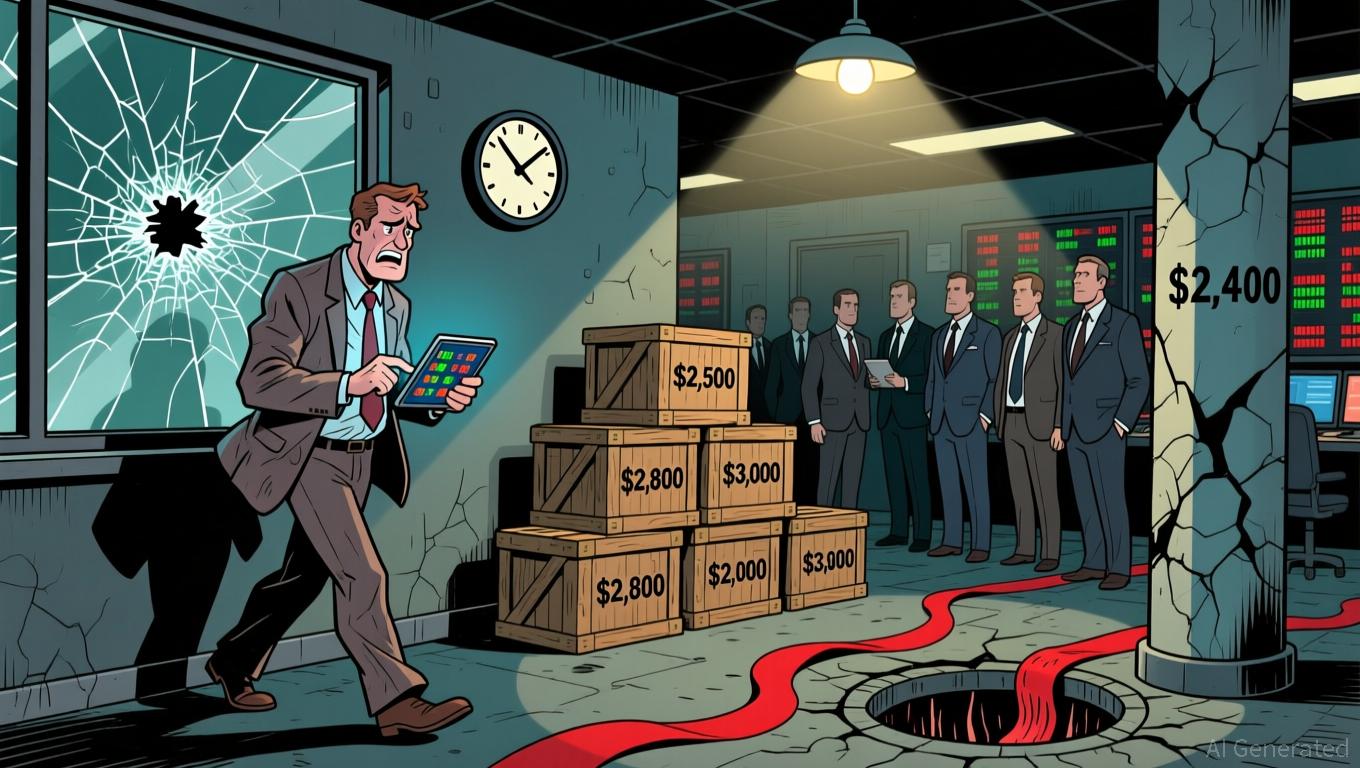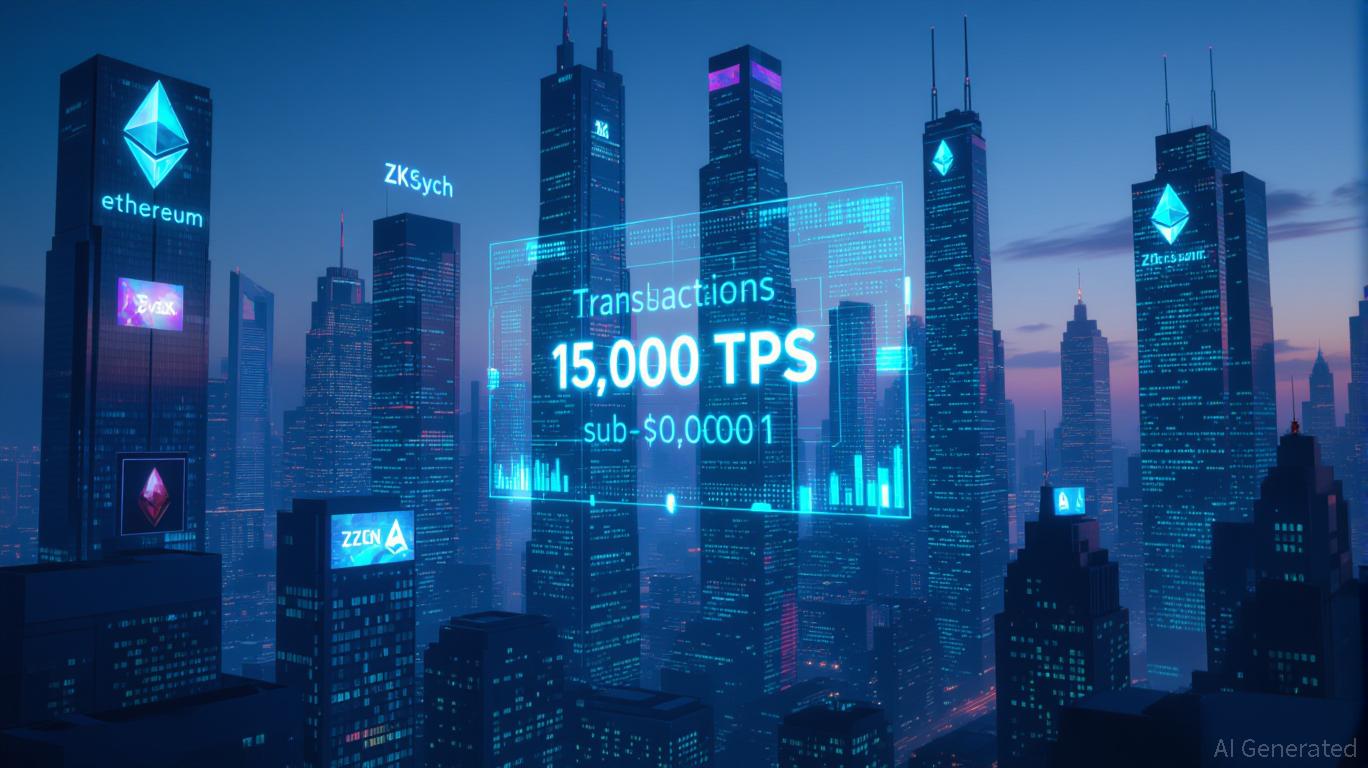Navigating Scams in Emerging Crypto Markets: Lessons Learned from the COAI Token Debacle
- COAI token's 88% collapse in 2025 exposed systemic DeFi risks, causing $116.8M losses and highlighting algorithmic stablecoin flaws. - Centralized token distribution (87.9% in 10 wallets) and opaque governance enabled manipulation, liquidity crises, and trust erosion. - Regulatory gaps persist globally, with inconsistent U.S. CLARITY Act enforcement and Southeast Asia exploiting jurisdictional loopholes. - Experts urge AI monitoring, smart contract audits, and diversified investments to mitigate risks in
The 2025 COAI Token Collapse: Exposing DeFi Vulnerabilities
The dramatic downfall of the COAI token in 2025 serves as a powerful illustration of the risks embedded within decentralized finance (DeFi) systems. With its value plummeting by 88% and total losses surpassing $116.8 million, the COAI incident brought to light critical weaknesses in algorithmic stablecoin design, lack of transparency in governance, and the dangers of centralized token allocation. This event highlights the pressing need for thorough investor risk assessment, advanced technological protections, and cohesive regulatory measures to safeguard the crypto landscape.
Key Takeaways for Investor Protection
One of the primary factors behind COAI’s collapse was its highly concentrated token ownership—nearly 88% of tokens resided in just ten wallets. Such centralization enabled market manipulation, triggered liquidity shortages, and rapidly eroded investor confidence. This underscores the importance for investors to carefully evaluate token distribution and project structures before investing.
- Ensuring Smart Contract Security and Openness: The COAI debacle demonstrated how hidden governance processes can conceal major vulnerabilities. Investors should favor projects that undergo comprehensive smart contract audits by established security firms. As highlighted by RWATimes, projects with open-source code and transparent governance are far less susceptible to manipulation.

- Leveraging AI for Real-Time Oversight: The rapid unraveling of COAI demonstrates the necessity for advanced monitoring solutions. Artificial intelligence tools can identify suspicious wallet movements, liquidity issues, and irregularities in governance, empowering investors to act before catastrophic losses occur.
- Diversification and Thorough Research: The COAI case is a stark warning against concentrating investments in unproven projects. Spreading assets across well-vetted DeFi platforms and traditional markets can help cushion the blow of unexpected failures. Industry leaders stress that crypto assets should be treated as high-risk, and capital should be allocated with caution.
Regulatory Challenges: Closing the Gaps
The COAI scandal also revealed significant shortcomings in regulatory clarity. For example, the U.S. CLARITY Act is interpreted inconsistently by agencies like the SEC and CFTC, leading to confusion over token classification and the enforcement of securities laws. Meanwhile, regions such as Southeast Asia—home to notorious operations like the Prince scam network and She Zhijiang’s alleged billion-dollar fraud—continue to exploit regulatory loopholes.
- Establishing Unified Global Standards: While the U.S. and U.K. have imposed sanctions on entities linked to COAI and Singapore has frozen substantial assets, these actions remain fragmented. A globally coordinated regulatory approach, similar to the EU’s MiCA (Markets in Crypto-Assets) regulation, is crucial to eliminate loopholes and ensure consistent compliance.
- Fostering International Cooperation: Myanmar’s recent crackdown on scam operations near its border with Thailand—resulting in the detention of 1,600 foreign nationals and the seizure of thousands of devices—demonstrates the necessity for cross-border collaboration. Regulatory agencies must share intelligence and coordinate enforcement to dismantle international fraud networks.
- Promoting Accountability: The COAI episode underscores the need to hold project founders and exchanges responsible for fraudulent conduct. Regulators should require strict identity verification (KYC) for token sales and enforce penalties for violations, ensuring that platforms like BitGet uphold transparency and compliance.
Conclusion: Strengthening Oversight and Investor Awareness
The COAI token collapse is not an isolated event but rather a reflection of deeper systemic risks within the cryptocurrency sector. Investors must prioritize diligent research, robust technological defenses, and prudent diversification. Regulators, meanwhile, face the challenge of harmonizing international standards, bridging regulatory gaps, and enforcing strict accountability. As the digital asset market continues to evolve, the interplay between innovation and regulation will ultimately determine whether these markets foster sustainable growth or become havens for illicit activity.
Disclaimer: The content of this article solely reflects the author's opinion and does not represent the platform in any capacity. This article is not intended to serve as a reference for making investment decisions.
You may also like
XRP News Today: Abu Dhabi’s Green Light Establishes UAE as a Pioneer in Stablecoin Development
- Ripple's RLUSD stablecoin gains Abu Dhabi regulatory approval as UAE advances digital finance leadership. - ADGM's "Accepted Fiat-Referenced Token" designation enables institutional use for lending and cross-border payments. - RLUSD's $1.2B market cap growth reflects institutional demand, backed by USD reserves and dual blockchain operations. - UAE's ADGM-DIFC regulatory synergy attracts global fintechs , with Ripple expanding partnerships across Africa and Asia. - Regulatory milestones position RLUSD to
Ethereum Updates: Ethereum Drops to $2,800, Prompting Surge in Demand for ZKP's Hardware-Based Presale
- Ethereum's price fell below $2,800, triggering $6.5M liquidations and testing critical support levels amid declining on-chain demand metrics. - Institutional players like BitMine accumulated 3.62M ETH (~$10.4B) despite the selloff, signaling long-term bullish conviction. - ZKP's hardware-driven presale gained traction with $17M in ready-to-ship Proof Pods and Miami Dolphins partnership for privacy-focused sports analytics. - Mutuum Finance's $19M DeFi presale and ZKP's auction model with $50K wallet caps

Vitalik Buterin Supports ZKsync: What This Means for Layer 2 Scaling
- Vitalik Buterin endorsed ZKsync in late 2025, highlighting its "underrated and valuable" work alongside the Atlas upgrade achieving 15,000 TPS and $0.0001 fees. - ZKsync's zero-knowledge rollups and EVM compatibility enabled institutional adoption by Deutsche Bank , Sony , and Goldman Sachs for cross-chain and enterprise use cases. - The Fusaka upgrade aims to double throughput to 30,000 TPS by December 2025, positioning ZKsync to compete with Polygon zkEVM and StarkNet in Ethereum's Layer 2 landscape. -

The ZK Atlas Enhancement: Revolutionizing Blockchain Scalability?
- ZKsync's 2025 Atlas Upgrade achieves 15,000–43,000 TPS with sub-1-second finality, addressing Ethereum L2 scalability bottlenecks via Airbender proofs and modular OS. - DeFi protocols like Aave and Lido leverage ZKsync's $0.0001/tx costs to unify liquidity, while Deutsche Bank and Sony adopt its trustless cross-chain infrastructure for compliance and transparency. - ZK token surged 150% post-upgrade, with TVL hitting $3.3B and analysts projecting 60.7% CAGR for ZK Layer-2 solutions by 2031 amid instituti
